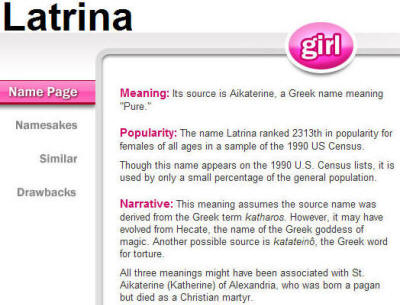RIKLBLOG
|
| Tomorrow |
| 13 March 2009 |
| Yesterday |
| Index |
| Eventide |
| SETI League |
| PriUPS Project |
| Bonus! |
| Contact |


A Spam and Three Scams
Onomastic Dissonance
I just invented that term. At least Google didn't have a reference, and that's good enough for me. My first recognition of this phenomenon was when I read a paragraph in Heinlein's Moon is a Harsh Mistress.
- Choy Lin and Choy Mu Fedoseev
-
Brothers who were Wyoming Knott's co-husbands. She divorced them after giving birth to a deformed child and realizing she had probably been affected by childhood exposure to radiation, the fault of the Lunar Authority's lack of concern for the colonists' health and safety. [From the just-now-discovered Heinlein Society concordance]
A premise of MiaHM is that earth's moon has been settled by prisoners from many countries, too many of them men. Heinlein explores some exotic marriage forms, and ends up with the two Choys or two Fedoseevs, depending on whether you select the Asiatic or European naming priority. Of course the names are Chinese-Russian compounds, something you rarely see—at least in the United States—hence the dissonance.
But the term "onomastic dissonance," which I just repeated for no good reason, and of which I am unjustifiably proud, was invented on behalf of spam and only retroactively applied to Heinlein. Spammers, it seems, have turned creating multi-ethnic names into a fine if somewhat random art. In addition to the daily dog's breakfast of spam emails purporting to be me in one email guise or another, and the jumbled graphics characters that are probably a foreign language uninterpretable by my (deliberately) primitive email reader, I get improbable multi-ethnic combinations as well. I doubt that one could find anywhere in the world an Ndoko Mandelbaum, although I'd be happy to be surprised. One's unlikely to find a Shakir Penobscot either, but in the list of spam names these examples are just as likely (or unlikely) as Robert Clark or Clark Robert.
|
The most entertaining, however, are names that engender a
double-take, even if they don't possess onomastic dissonance. I
remember the first time I got a spam from someone claiming to be a "LaTrina."
I almost couldn't stop laughing; it's hard to believe that anyone who
had ever been outdoors for more than 12 consecutive hours would think to
condemn a child with that moniker. I, who never forward any
internet crap, sent it to some selected associates, and we all had a cackle, snicker, grunt, or guffaw as was our wont. The joke was on us. It turns out that LaTrina (spelled without the gratuitous internal capital) is entirely valid. From babynamer.com: |
 |
Bernie the Ponzi Piker?
It's not $50 billion any more. Bernie is in jail, the prosecutor has made a report, and it turns out that the sum involved in the fraud is actually $68 billion. That's $18 billion more than even Bernie mentioned when he admitted what he was doing. But you know how skeptical I am of numerical claims, especially when they appear in the press. So let's think about those billions, however many they are, for a moment.
What is a Ponzi scheme? It's one in which early investors get their money back with the funds that later investors put in. If a Ponzi scheme pays 10% per day, I can invest $1000 today, you can invest $1000 tomorrow, and I can demand my $1100 tomorrow as well. I will get my $1100, leaving only $900 left to pay you back unless another investor can be found the next day. Meanwhile, the schemer gets to rake off as much as he chooses, leaving the later investors more or less in the lurch.
Bernie, it turns out, put his investors' money into a Chase Manhattan bank account. It presumably paid some modest interest rate. Let's say 3%. Bernie promised a 10% interest rate, so the 7% shortfall plus the Madoff rake off came from new money, and the scheme unraveled when investors wanted their money back but there was no new money to be had. Does this mean it's a $68 billion fraud? No! Although Madoff was certainly generous with himself and his family, he didn't steal and somehow manage to spend $68 billion. Rather, the vast majority of the money, probably over 99% went back to the investors! The problem, of course, is that some got more or much more than they put in, others got less or even lost it all. In most cases, it was more luck or the lack thereof that decided the "winners." So in that sense, it was maybe a few-hundred-million dollar fraud.
(If that scenario seems somehow familiar: Everybody puts in money, most people get back money in varying amounts, with a rake off for those in charge, you'll probably come up with the word "taxation" in a few more minutes. Another scenario: Everybody puts in money, and only a few people get it back in varying amounts, with a truly majestic rake off, you'd be describing a "state lottery." If I had a choice between participating in a Ponzi scheme or a state lottery, I know what I'd choose! But I digress.)
Back again to the $68 billon. Let's say I put $1000 into Bernie's scheme in 1980 and watched my money (hypothetically) grow at 10% per year. When it was all over, my statement would show $15,863, and I might collect it in Monopoly money if I were lucky. If I had withdrawn it several years earlier, however, I might only have made $12,000, but it would have been real money and mine to keep. The $68 billion figure was based on the statements of those whose money had been disappeared, of which my $15,863 might have been a part. So how much did I really lose? The $15,863 which was on my fabulous statement? The $12,000 I might have collected had my timing been better? The $2300 that I might have accumulated by putting the original $1000 in the same Chemical Bank account Bernie used? Of course there's no real answer to that. Other than the hard $1000 that disappeared from my coffers when I "invested" it, it's all shudda-cudda-wudda.
So, to summarize: When you see the $68 billion figure, or whatever it may finally turn out to be, it doesn't mean much. A number of people and organizations made money. A number of people and organizations very recently and truly tragically lost money, including their life savings and total charitable and educational endowments. To the extent that the law can figure out how to accomplish it, some of the winners' money will be redistributed to some of the losers, and you and I via the SIPC will end up paying (I'm guessing) a few hundred million dollars in recompense to the losers, ultimately via our taxes. Bernie Madoff and perhaps some of his not-yet-even-alleged henchfamily will be a further drain on our finances while living in fully deserved durance vile.
But it's not a $68 billion fraud, as entertaining as that might seem. Unlike a proper Ponzi scheme, where the perpetrator gets to keep almost all the money and, with luck, manages to disappear, Bernie got to keep a tiny fraction and will most likely spend the rest of his life in jail.
Neither a Texter Nor a Textee Be
Bernie went on for too long up there. I'll save the two remaining scams for tomorrow, well hinted at by the accidental rhymes in my headings.
Shame on You, Shame on Me
|
Special Advertising Section Please buy this lovely blue Corvette ZR1! Now, with Collector's Kit |
 |
NP: "Bitter Sweet Symphony" - The Verve
| © 2009 |
| Richard Factor |
